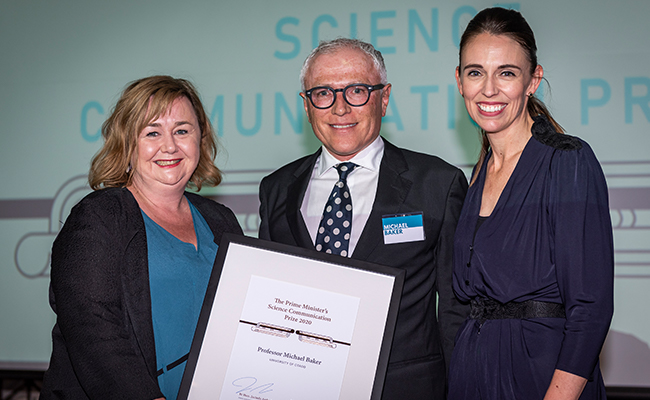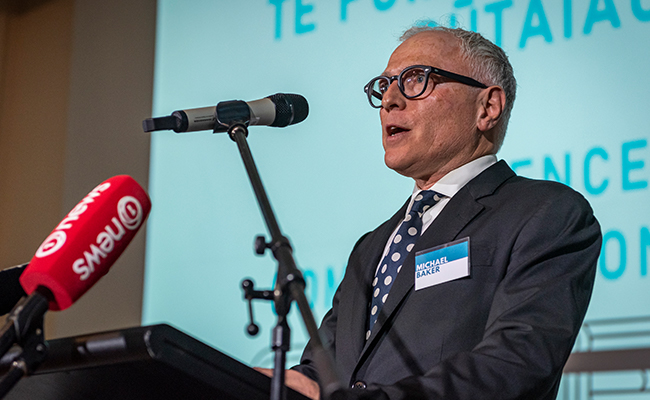Wednesday 14 April 2021 11:52am

Research, Science and Innovation Minister Dr Megan Woods and prime minister Jacinda Ardern presenting the award to Professor Baker. Photos courtesy of The Prime Minister’s Science Prizes Secretariat.
The winner of the 2020 Prime Minister’s Science Communication Prize, Professor Michael Baker MNZM from the Department of Public Health in Wellington describes himself best as a ‘scientist who communicates’.
“I felt absolutely compelled to communicate because at some points I thought New Zealand was heading off a cliff, particularly a year ago when we were at a real crossroads as to whether to follow a flatten the curve approach or to forge a different direction to eliminate the virus.”
Professor Baker has been New Zealand’s ‘go-to’ science expert on COVID-19 since the earliest days of the pandemic, racking up more than 2,000 media interviews since January 2020.
Despite his media profile, his first priority with science communication has always been to get the science right. He has published more than 25 peer-reviewed publications on COVID-19, including in the world’s highest-impact medical journals, the New England Journal of Medicine, The Lancet and The BMJ. Since the start of the pandemic he and Department of Public Health colleagues Professor Nick Wilson and Dr Amanda Kvalsvig have produced around 50 science blogs and features on COVID-19.
Professor Baker has been a Professor of Public Health at the University since 2013 and is Director of the Health Environment Infection Research Unit (HEIRU) and Leader of Co-Search, a Health Research Council funded group involved in multi-disciplinary research to support the COVID-19 response.
He effectively wrote the book on New Zealand’s hugely successful COVID-19 elimination strategy, using multiple forms of science communication to actively promote a move away from a mitigation strategy in early March 2020. At the same time, he was advocating the country move into an intense lockdown to stamp out the virus and allow time to build capacity to manage the pandemic.
He was, he says, hugely relieved when the measures were adopted by the Government.
“I felt absolutely compelled to communicate because at some points I thought New Zealand was heading off a cliff, particularly a year ago when we were at a real crossroads as to whether to follow a flatten the curve approach or to forge a different direction to eliminate the virus.”
He says for scientists who communicate, it’s important to identify communication goals at each point.
One of his goals was to take the elimination message to a global audience.
Alongside publishing research papers in the top international medical journals, he has done more than 100 interviews with international media, including live interviews with CNN, BBC and Al Jazeera. He has also appeared on television interviews in Australia, where his identical twin brother, David, is a practising GP, confusing some of his brother’s patients, who were surprised to see ‘their GP’ on the news.

Professor Michael Baker.
Professor Baker says he is hugely appreciative of the support he has received from his home whānau of wife Katie, son George and daughters Euphemia and Augusta over the past 15 months, as well as his work whānau at the Department of Public Health in Wellington.
University of Otago Deputy Vice-Chancellor (Research and Enterprise), Professor Richard Blaikie, says the University is exceptionally proud of Professor Baker’s achievements in translating his expert knowledge into practical and accessible information to inform the Government and people of Aotearoa in a time of crisis.
“His efforts, and those of colleagues supporting him, have undoubtedly helped to save lives and reduce the wider impact of the pandemic. The global impact of Professor Baker’s work is also immense, due in no small part to his commitment to be accessible at all hours of the day and night to the time-critical needs of those seeking his succinct and incisive opinions.”
The Prime Minister’s Science Prize comes with $75,000 and the majority of this money will go to support the establishment of a Public Health Communication Centre to be based in the Department of Public Health at the University of Otago, Wellington.
“I have a sense of optimism that we can actually do much better in New Zealand and globally at combatting the huge threats and challenges that we face. And I love the idea that Governments can pick up these ideas and it can make a difference in people’s lives.”
Professor Baker says the new Centre will aim to communicate evidence to the public and decision-makers about opportunities to improve public health, equity, and sustainability.
“I have a sense of optimism that we can actually do much better in New Zealand and globally at combatting the huge threats and challenges that we face. And I love the idea that Governments can pick up these ideas and it can make a difference in people’s lives.”
Professor Baker was appointed a Member of the New Zealand Order of Merit for services to public health science in the 2021 New Year Honours. He was also recently named Wellingtonian of the Year for his contribution to shaping New Zealand’s successful science-based COVID-19 response.
He studied at the University of Auckland, where he graduated MB ChB and earned a Diploma in Obstetrics, and at the University of Otago, where he obtained a Diploma in Public Health before specialist training in public health medicine.
The Government introduced the Prime Minister’s Science Prizes in 2009 as a way of raising the profile and prestige of science among New Zealanders. They are administered by the Royal Society Te Apārangi.
The Science Communication prize is awarded to a practising scientist who can demonstrate an interest, passion and aptitude for science communication and public engagement, or to someone who has developed expertise in public engagement or communicating complex scientific or technological information to the public or science community.
The last University-connected communicator to receive the award was Dr Ian Griffin, Director of the Otago Museum and an Honorary Fellow in the Department of Physics, who won the Prime Minister’s Science Media Communication Prize in 2015.
